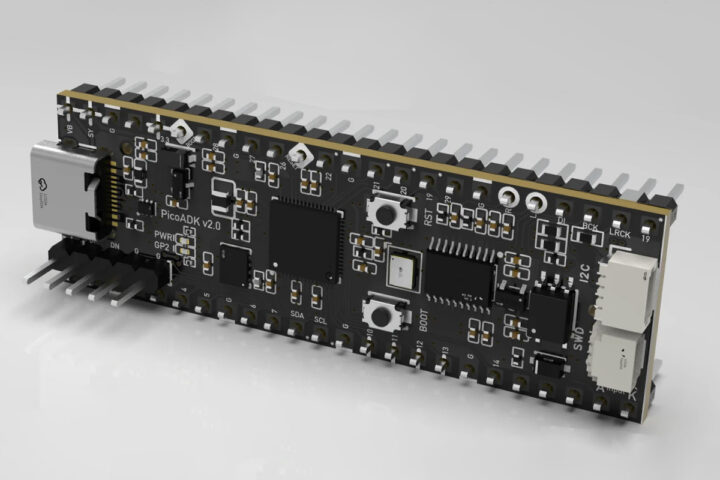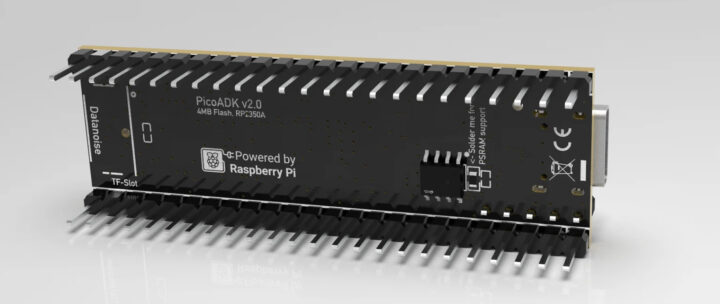After the success of PicoADK v1, Datanoise has recently announced the launch of its PicoADK v2 music synthesizer built around the Raspberry Pi RP2350 MCU. The board supports projects like custom synthesizers, audio effects, and noise generation, and the 8 MB QSPI PSRAM of the RP2350 makes it ideal for memory-intensive applications such as long delays. Additionally, it features a SWD debug port, microSD card support, a MIDI-in circuit with an optocoupler, USB Type-C, user and power LEDs, and more.
Previously, we have written about various similar synthesizer boards, like the Arduino-based MIDI controller, and we have seen products like the TinyLlama x86 retro computer, which uses the Raspberry Pi Zero 2 W as a MIDI synthesizer.
PicoADK v2 music synthesizer specification
- Microcontroller – Raspberry Pi RP2350A MCU
- CPU – Dual-core Arm Cortex-M33 processor @ 150MHz
- Memory – 520KB internal RAM
- Storage – 8KB OTP
- Package – QFN-60; 7×7 mm
- Memory – Optional 8MB QSPI PSRAM
- Storage
- 4 MB QSPI Flash for code and data
- MicroSD card on the bottom of the board
- USB – USB Type-C for programming
- I/Os – All 30x I/Os broken out via 48x through hole pin header
- QWIIC / I2C connector
- USB host and device
- SWD for debugging
- HSTX peripheral
- I2S pins exposed on the headers, to allow for connecting an ADC.
- Security – Secure Boot, Arm TrustZone
- Misc
- Reset and Boot Buttons
- Power LED
- User LED
- 12MHz crystal
- MIDI In-Circuit with Optocoupler
- Power Supply
- Supply Voltage – 3.6 to 6.5V DC via “5V” pin
- 500mA 3.3V LDO
- LiPo supply and charging circuit (with charging LED)
After some searching, I found that Datanoise does have a GitHub repository for the PicoADK firmware, where they mention the RP2350-based PicoADK v2. However, the information is very limited at the time of writing.
The company does not provide specific information regarding software/firmware for the PicoADK v2, but based on the repo above the PicoADK features FreeRTOS, USB MIDI, Vult DSP, Hardware Plumbing, DMA, and more, and relies on the Pico C/C++ SDK. Unless the RP2350 firmware does not require any modifications compared to the RP2040 firmware, the software development status for the new board is unclear as the last release (v2.0.2) is dated May 2023, and the last commit was three months ago,
The PicoADK v2 music synthesizer can be purchased for €39,00 or $42.13 on the Datanoise store.

Sayantan Nandy, an electronics engineer with over four years of hands-on experience in PCB design, circuit development and power electronics, is proficient in EAGLE CAD, Ki-Cad, and Altium. He has a proven track record of delivering efficient and effective systems. His expertise extends from R&D, and prototyping to production support, making him a valuable asset to any engineering team.
Support CNX Software! Donate via cryptocurrencies, become a Patron on Patreon, or purchase goods on Amazon or Aliexpress






